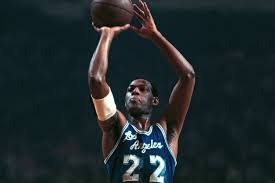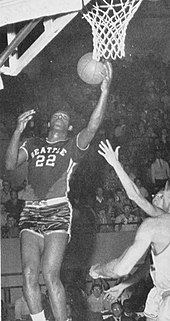My generation only knows Elgin Baylor as the least successful executive in NBA history. And that's not fair. He was a transformational figure in the game's history.
Elgin Gay Baylor was born on September 16, 1934 in Washington, D.C. On September 9, 2017, the anniversary of the establishment of the District of Columbia, I listed my picks for the District's Top 10 Athletes. I listed Baylor at Number 2, behind Hall of Fame safety Willie Wood of the Green Bay Packers.
Baylor attended Joel Elias Spingarn High School. Spingarn was an African-American educator and literary critic. In 1913, he established the Spingarn Medal, awarded annually for outstanding achievement by an African-American -- effectively, black America's Nobel Prize. The school closed in 2013. Its graduates include basketball legends Baylor, Dave Bing, Adrian Dantley and Sherman Douglas.
A forward, Baylor attended the College of Idaho, then transferred to Seattle University. He led them to the 1958 NCAA Final, losing to the University of Kentucky, but being named the Tournament's Most Outstanding Player. He was drafted by the Minneapolis Lakers, moving with them to Los Angeles in 1960.
An 11-time All-Star, he was named the NBA's Rookie of the Year in 1959, and led the Lakers to the Western Conference Championship in 1959, 1962, 1963, 1965, 1966, 1968, 1969 and 1970. The 71 points he scored on November 15, 1960 was a record, soon broken by Wilt Chamberlain. The 61 points he scored in Game 5 of the 1962 NBA Finals remains an NBA Finals record.
He was hailed as one of the earliest players to make the game "vertical" -- that is, to have airborne acrobatics near the basket. He was named to 11 All-Star Games, the NBA's 35th Anniversary Team and its 50th Anniversary 50 Greatest Players, and the Basketball Hall of Fame. His Number 22 was retired by both his college and his pro team. Seattle University named its court for him, and the Lakers dedicated a statue to him outside the Staples Center.
But there's a cloud over him. Those 8 NBA Finals he went to? The Lakers lost all 8, despite also having Jerry West, and later Gail Goodrich, and, still later, Chamberlain. A knee injury began slowing him in the 1963-64 season, and it got worse during the 1965 Playoffs. Two games into the 1970-71 season, he ruptured his Achilles tendon, and was out the rest of the way.
Nine games into the 1971-72 season, he retired. The very next day, the Lakers began a 33-game winning streak, which remains a record for any North American major league sports franchise. And they finally won the NBA title that year. They gave him a championship ring anyway.
He was on the initial coaching staff of the expansion New Orleans Jazz in 1974-75, and later served as head coach, but never made the Playoffs. In 1986, he was named vice president of basketball operations for the Los Angeles Clippers, and remained in that office until 2008, until he was 74 -- partly because Clippers owner Donald Sterling was the only NBA owner would put up with his poor record, and partly because Baylor was the only man who would put up with Sterling never giving a GM enough money to build a good team.
He was named NBA Executive of the Year in 2006, but finally quit when even he couldn't take Sterling's abuse, racial and otherwise, anymore. He never worked in basketball again.
He died yesterday, March 22, 2021, in Los Angeles, of natural causes. He was 86 years old. He was survived by his wife Elaine, his son Alan, and his daughter, Alison.


/cdn.vox-cdn.com/uploads/chorus_image/image/69007647/944358686.0.jpg)

No comments:
Post a Comment